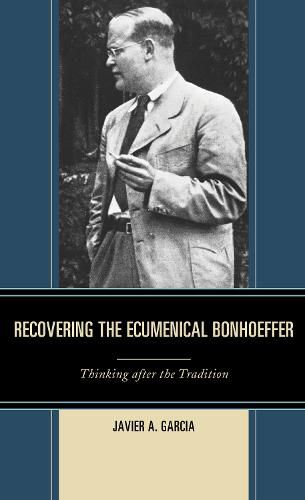Readings Newsletter
Become a Readings Member to make your shopping experience even easier.
Sign in or sign up for free!
You’re not far away from qualifying for FREE standard shipping within Australia
You’ve qualified for FREE standard shipping within Australia
The cart is loading…






In Recovering the Ecumenical Bonhoeffer, Javier A. Garcia explores the possibilities for Dietrich Bonhoeffer’s theology to revitalize interest in the ecumenical movement and Christian unity today. Although many commentators have lamented the waning interest in the ecumenical movement since the 1960s, the celebration of the 500th anniversary of the Protestant Reformation in 2017, coupled with recent in-roads such as the ecumenical efforts of Pope Francis, have opened new possibilities for the ecumenical project. For this purpose, Garcia presents Bonhoeffer as a helpful model for contemporary ecumenical dialogue. He finds important points of convergence between Bonhoeffer and Calvin, thereby establishing potential areas of rapprochement between the Lutheran and Reformed traditions. Beyond examining the state of ecumenism and unfolding the ecumenical promise of Bonhoeffer’s thought, Garcia offers some concluding thoughts on the future of ecumenical engagement in a secular age. Altogether, he proposes a recovery of the ecumenical Bonhoeffer for envisioning new possibilities for church unity in our day.
$9.00 standard shipping within Australia
FREE standard shipping within Australia for orders over $100.00
Express & International shipping calculated at checkout
In Recovering the Ecumenical Bonhoeffer, Javier A. Garcia explores the possibilities for Dietrich Bonhoeffer’s theology to revitalize interest in the ecumenical movement and Christian unity today. Although many commentators have lamented the waning interest in the ecumenical movement since the 1960s, the celebration of the 500th anniversary of the Protestant Reformation in 2017, coupled with recent in-roads such as the ecumenical efforts of Pope Francis, have opened new possibilities for the ecumenical project. For this purpose, Garcia presents Bonhoeffer as a helpful model for contemporary ecumenical dialogue. He finds important points of convergence between Bonhoeffer and Calvin, thereby establishing potential areas of rapprochement between the Lutheran and Reformed traditions. Beyond examining the state of ecumenism and unfolding the ecumenical promise of Bonhoeffer’s thought, Garcia offers some concluding thoughts on the future of ecumenical engagement in a secular age. Altogether, he proposes a recovery of the ecumenical Bonhoeffer for envisioning new possibilities for church unity in our day.